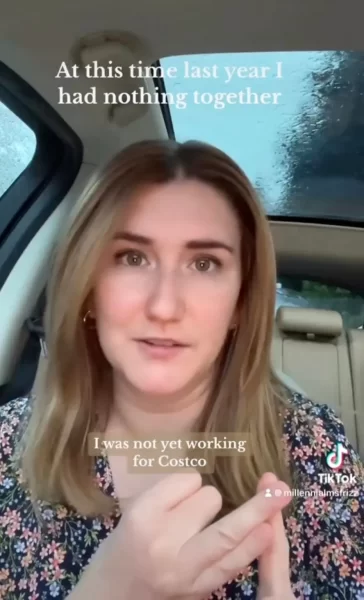The ADA needs enforcement
It is a regular afternoon in my town and I decide I want to grab a tea or coffee, yet in order to do so my mother has to lift me over a curb and a cement slab step as my sister holds the door.
Or maybe I decide I want to go to dinner with my dad at his favorite restaurant but there are stairs and he claims the building has been grandfathered in.
These are some of the common struggles of living as someone with a disability and specifically being a daily wheelchair user. In a world that should be up to Americans With Disabilities Act (ADA) code and accommodating for all but those with disabilities are being disserviced.
“What is the grandfather clause? There isn’t one. That’s a misconception under the ADA, that the buildings that were built before the ADA are grandfathered in. So the ADA has five titles, the first one is employment, the second one is state and local government services. The third one is places of public accommodation, fourth what is telecommunications and five is a miscellaneous category. So they put a whole bunch of associated weird things in there. Titles two and three which is mostly what I think what you’re talking about, because you’re looking at building structural standards. There is no grandfather clause so the idea was that under title two, which is state and local governments that municipalities and the state government had to take a look at their buildings. And their services and extend it in existing buildings, the structural standard is called Program Access. Which is now not necessarily something that requires you to get out you know the hammer and nails, but it does require you to look and ensure that your programs are accessible to persons with disabilities,” said Gretchen, an executive director from Disability Rights Connecticut, a non profit organization that helps provide resources to file a grievance or get educated on the language of the ADA.
The ADA came about in 1990 and is considered a civil rights law. This law was created in order to provide equality and service to people with any disabilities. In order to do so businesses and buildings were now required to have accessible bathrooms and wide enough entrances, as well as ramps and no curbs getting into an entrance if needed.
There were not always as many regulations, and it was not always as strict but new revisions have been made as time goes on. In fact after the regulations of 1990, business owners were given plenty of time to update their buildings and received nothing but understanding, with two years being given to be up to the new code.
However, this doesn’t stop many businesses even twenty years later from using excuses like the grandfather clause, loopholes in the language, or non-compliance all together and yet they get away with it. Why?
“Anything under title two, or anything that’s newly built after 1992 I believe. They have to be successful so what they allowed even though it was passed in 1990 they gave places you know, a couple of years. If there were permits and things to figure that out, but everything has to meet and any new construction has to meet the Americans with Disabilities Act accessibility guidelines,” Gretchen said.
It may be viewed as an inconvenience or even unnecessary to business owners, who have never experienced having a disability or having someone in their lives who experiences such hardships.
The ADA is an amazing law, and I am grateful for it. Though I feel some of its wording may need some revision because it can be misconstrued and interpreted by many businesses differently in order to make things easier.
The wording that can truly get lines blurred is that the ADA states that for certain buildings changes must be “readily achievable” according to the law document itself. The term is very loose and does not clarify clearly what is considered readily achievable.
“If it’s readily achievable for you to make the changes necessary to improve your accessibility you would do that. Now that the standards in both cases are going to be somewhat dependent on what those are, how much the cost is, and whether or not it changes the nature of what you’re supposed to be doing. There are some exceptions for historic buildings and if there are church sponsored programs that the church is actually sponsoring a program exempt from the title today. So you would do an assessment of your place, that’s what you look at for structure,” said Gretchen.
With so much inexperience and written leniency in some sections, this law can get overlooked by many. One prime example of overlooking this law is President Donald Trump, who has had many lawsuits and issues in obeying this law throughout time’s past.
Trump has had “at least eight lawsuits” according to an article by Huffington Post. For this to happen so many times clearly shows disregard to people with disabilities.
He lost each case and only almost won a single case, he is known for having dragged out these lawsuits when it was possible to do so. These lawsuits included cases against his Tower located in New York City as well as his International Hotel. He later made changes to the hotel after stair complaints and lack of ramps, after a lawsuit in 2004.
In 1997 James Conlon, a guest, needed help to use the bathroom in one of Trump’s hotels even though it was a handicap room specifically he was paraplegic. To have to ask for help can be incredibly embarrassing and make someone in his situation feel very co dependent on other people. Nobody should be forced to have to do that when they’ve been through so much to learn how to be independent.
Trump did not go to court for the case until a year later and had to pay Colon´s court fees as well as do renovations to his hotel, which he did not do until a year after the time in court -two years after the incident!
This is just one appalling example of too many issues complying. Other issues have included alleged locked elevators with no knowledge of proper operation on site.
“The structural standards and skills are very much of a compromise, because they’re never done by people with disabilities. They are done by Architects and people with disabilities together in a compromise so even meeting a minor standard you need to really pay attention to what those are because there are true reasons for them,” said Gretchen.
“Under the Americans with Disabilities Act you can file under both titles two and three you can file a complaint with the office for civil rights in the US Department of Justice in Connecticut. Though you may want to contact the US attorney’s office in Connecticut because they will get assigned those cases and sometimes they will take it.”
Trump’s hypocrisy truly becomes apparent when taking a look at his Proclamation just last year in 2019.
“Today, we renew our commitment to empowering Americans with disabilities through equal access so they can achieve their full potential, and we celebrate their contributions to our great Nation.”
That commitment has not translated in the past, though we can hope for the future. As many remain oblivious to how detailed the ADA is, even the disabled community may not have full awareness of their rights, Especially, those, as in my case, who have grown up in an able bodied family and majority of peers.
“Under the Department of Justice they also have a thing called project Civic Access. If they get a complaint they may come down and actually do an assessment of the whole town and have conversations with the Chief elected officials and come to some kind of a settlement agreement where changes have to be made,”said Gretchen.
“Naugatuck looks like it might be a really great place for civic project access. It’s really cute, the pictures are very cute but everybody should be entitled to access very cute.”
As becomes evident after hearing this interview, it is no wonder why cases like one against Walmart. Where a disabled worker was the victim of discrimination when trying to get a job at their local Walmart. He was refused a job due to his disability, and as a result won 5.2 million dollars in court. Equality for people with disabilities is not something to take lightly and if the other cases and especially this one does not highlight that enough I don’t know what will be for society and business owners in the professional world.
Everyone is entitled to an equal living experience and working experience, even if that requires some more work in communities.

I am a senior at NHS. I am taking Journalism 2 because I hope to be a writer in the future and I am truly passionate about writing.








